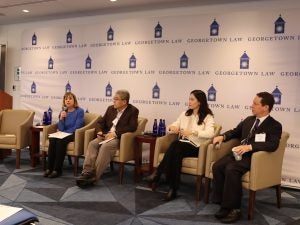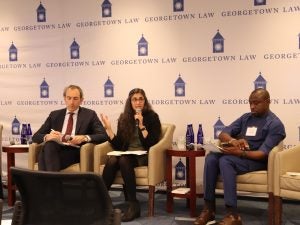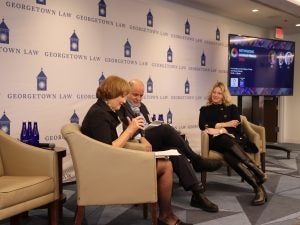Rethinking World Trade 2024
Our second annual Rethinking World Trade conference took place on April 3, 2024, bringing together the academic community, trade practitioners, and policymakers to examine new ideas for a better trading system that is inclusive of all and promotes sustainable development.
Rethinking World Trade 2024 was a half day-long, in-person event at the Georgetown University Law Center with panelists presenting avant-garde research and policy recommendations. This year’s Rethinking World Trade conference featured two panels on the following themes:
1) The US-China Relations in a “Post-China Shock” Era, moderated by Wendy Cutler from the Asia Society Policy Institute in discussion with Scott Kennedy from CSIS, Professor Henry Gao from the Singapore Management University, and Huan Zhu from the China Trade Monitor.
2) The Rise of Subsidies and the Clash of Industrial Policy, moderated by Rem Korteweg from the Clingendael Institute in discussion with Olabisi Akinkugbe from Dalhousie University and Inu Manak from CFR.
The event also featured the launch of the new book, The Sustainability Revolution in Trade Agreements, edited by Professors Kathleen Claussen and Geraldo Vidigal. During the launch Professor Vidigal had a panel discussion with Martha Aldana from the U.S.-Peru Trade Promotion Agreement, Zak Smith from the Natural Resources Defense Council, Elizabeth Trujillo from the University of Houston Law Center, Jane Nishida from the EPA’s Office of International and Tribal Affairs (OITA), and Alexandra Whittaker from the House Committee on Ways and Means.
We closed the event with a conversation between Shawn Donnan, from Bloomberg, and our Co-Directors Jennifer Hillman and Katrin Kuhlmann.
Access to the video recordings of the panels can found found to the right in the sidebar or within each blog post below.
Rethinking World Trade 2024 Program and Speaker Bios

Rethinking World Trade 2024 Panel I: U.S.-China Relations in a Post-"China Shock" Era
The Center on Inclusive Trade and Development (CITD) held its second annual Rethinking World Trade conference on Wednesday, April 3rd. Our first panel, which followed the launch of “Sustainability in International Trade Agreements,” a book co-edited by Georgetown Law Professor Kathleen Claussen, focused on U.S.-China relations in the aftermath of the so-called “China Shock.” This term refers to the roughly 2 million jobs, particularly in manufacturing, lost in the U.S. to trade with China between 1997 and 2011 due (at least in part) to an influx of Chinese imports. Although these figures have been considerably debated, it is undeniable that the U.S.-China trading relationship has had a significant impact on global trade. Our panelists included Professor Henry Gao of Singapore Management University; Huan Zhu, the Vice-President of the China Trade Monitor; Scott Kennedy, Senior Adviser and Trustee Chair in Chinese Business and Economics at the Center for Strategic and International Studies; and was moderated by Wendy Cutler of the Asia Society Policy Institute.

Rethinking World Trade 2024 Panel II: The Rise of Subsidies
The Center on Inclusive Trade and Development (CITD) held its second annual Rethinking World Trade conference on Wednesday, April 3rd. In addition to a book launch and a panel on U.S.-China relations, we hosted a panel discussion on subsidies and industrial policy. As economies around the world seek to reduce economic dependencies and enhance economic security while moving towards decarbonization, the resurgence of industrial policy, including subsidies, is evident. The panel featured Olabisi Akinkugbe, Professor of Law at Dalhousie University, and Inu Manak, the Fellow for Trade Policy at the Council on Foreign Relations. The discussion was moderated by Rem Korteweg of the Clingendael Institute.

Rethinking World Trade 2024: In Conversation with Shawn Donnan
To conclude our second annual Rethinking World Trade event, CITD Co-directors Professors Jennifer Hillman and Katrin Kuhlmann engaged in conversation with Shawn Donnan. Shawn previously served as the world trade editor for the Financial Times, where he covered global trade and development, as well as the International Monetary Fund and the World Bank. Now a senior writer at Bloomberg, Shawn weaves together the macroeconomic picture of trade and globalization, with a focus on their impact on local communities.
